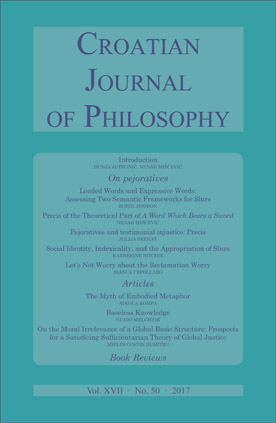Social Identity, Indexicality, and the Appropriation of Slurs
Social Identity, Indexicality, and the Appropriation of Slurs
Author(s): Katherine RitchieSubject(s): Theoretical Linguistics, Semantics, Sociolinguistics, Philosophy of Language
Published by: KruZak
Keywords: Slurs; appropriation; reclamation; indexicals; social groups;
Summary/Abstract: Slurs are expressions that can be used to demean and dehumanize targets based on their membership in racial, ethnic, religious, gender, or sexual orientation groups. Almost all treatments of slurs posit that they have derogatory content of some sort. Such views—which I call content based— must explain why in cases of appropriation slurs fail to express their standard derogatory contents. A popular strategy is to take appropriated slurs to be ambiguous; they have both a derogatory content and a positive appropriated content. However, if appropriated slurs are ambiguous, why can only members in the target group use them to express a non-offensive/positive meaning? Here, I develop and motivate an answer that could be adopted by any content-based theorist. I argue that appropriated contents of slurs include a plural first-person pronoun. I show how the semantics of pronouns like ‘we’ can be put to use to explain why only some can use a slur to express its appropriated content. Moreover, I argue that the picture I develop is motivated by the process of appropriation and helps to explain how it achieves its aims of promoting group solidarity and positive group identity.
Journal: Croatian Journal of Philosophy
- Issue Year: XVII/2017
- Issue No: 50
- Page Range: 155-180
- Page Count: 26
- Language: English
- Content File-PDF

